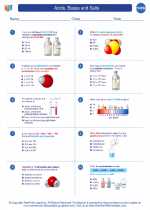Behavior in Chemistry
In chemistry, the term "behavior" refers to how substances or elements react under various conditions and in different environments. The behavior of a substance can be influenced by factors such as temperature, pressure, and the presence of other substances.
Factors Affecting Behavior
Several factors can influence the behavior of substances in chemistry:
- Temperature: Changes in temperature can affect the speed and nature of chemical reactions. For example, increasing the temperature can often increase the rate of a reaction.
- Pressure: Some substances behave differently under high or low pressure conditions. Pressure can affect the volume and density of gases, for example.
- Concentration: The concentration of a substance can impact its behavior in a solution. Higher concentrations may lead to more rapid reactions.
- Catalysts: Catalysts can influence the behavior of substances by increasing the rate of a chemical reaction without being consumed in the process.
Key Concepts to Understand
When studying the behavior of substances in chemistry, it's important to understand the following key concepts:
- Chemical Reactions: How substances interact and transform into new substances through chemical reactions.
- Equilibrium: The state in which the rates of the forward and reverse reactions are equal in a chemical system.
- Solubility: The ability of a substance to dissolve in a solvent under specific conditions.
- Acid-Base Behavior: Understanding the behavior of acids and bases, including pH, neutralization, and titrations.
Study Guide
When studying the behavior of substances in chemistry, consider the following study guide:
- Review the basic principles of chemical reactions and the factors that influence reaction rates.
- Understand the concept of equilibrium and how it applies to chemical systems.
- Learn about solubility and the factors that affect the solubility of substances in different solvents.
- Study the behavior of acids and bases, including their properties, reactions, and applications in various chemical processes.
- Practice solving problems related to the behavior of substances, such as calculating reaction rates, equilibrium constants, and pH values.
By mastering the behavior of substances in chemistry, you'll gain a deeper understanding of how different elements and compounds interact and transform under various conditions, laying a solid foundation for more advanced studies in the field of chemistry.
[Behavior] Related Worksheets and Study Guides:
.◂Chemistry Worksheets and Study Guides High School. Acids, Bases and Salts

 Worksheet/Answer key
Worksheet/Answer key
 Worksheet/Answer key
Worksheet/Answer key
 Vocabulary/Answer key
Vocabulary/Answer key
